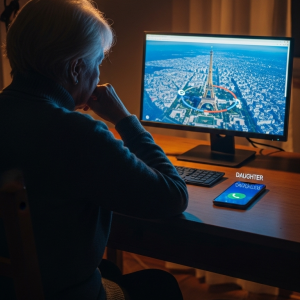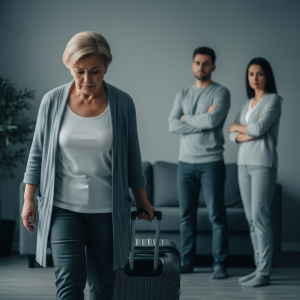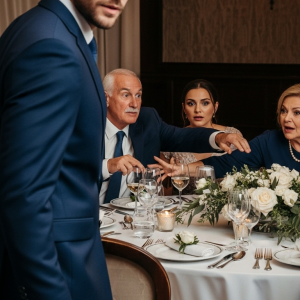My parents left me in foster care at twelve years old so they could travel the world with my sister. Now, twelve years later, they’re jobless, desperate, and reaching out. So, I gave them exactly what they deserved.
My name is Adam. Back when I was twelve, I thought my family was normal. My parents, Laura and Greg, and my older sister, Emma. Emma was the golden child. Her drawings got prime real estate on the fridge; I got a perfunctory, “That’s nice, Adam.” I wasn’t a bad kid. I was just background noise. I didn’t hate Emma for it; it wasn’t her fault they treated her like a trophy and me like a participation ribbon.
The day my world fell apart started with my mother calling me downstairs in that strained, overly calm voice parents use right before they drop a bomb. I walked into the living room to find them sitting on the couch, their expressions far too serious for it to be about spilled milk. “Sit down, Adam,” Greg said, his tone clipped, like this was a business meeting. Laura took a deep breath. “Adam, we need to talk about something important. We’ve hit some financial struggles, and… we can’t afford to take care of you anymore.”
I thought I’d misheard him. Can’t afford me? Was I a subscription they were canceling? “It’s not your fault, sweetie,” Laura continued, her sympathy feeling hollow and rehearsed. “We had to make a really hard decision.” “What do you mean?” I asked, my voice small. She explained that they’d found a foster home for me. “It’s just temporary,” she kept repeating, as if the word was a magic spell that could make the hurt disappear. “Why can’t Emma go?” I blurted out. Laura’s face turned to ice for a split second. “Emma’s in school, Adam. She needs stability.” Like I didn’t. Before I could argue, Greg cut in. “This isn’t about choosing. It’s about what makes the most sense right now.”
I started to cry then—ugly, gulping sobs. How else does a twelve-year-old react to being told his parents are giving up on him? Laura tried to hug me, but I pushed her away. The next day, they packed a small duffel bag for me and we drove to the foster home. The silence in the car was heavy enough to suffocate. I kept hoping one of them would look back and say, “This is a mistake. You’re coming home.” They never did.
When we arrived, I hesitated in the car. Greg turned around, his face impatient. “Come on, Adam. Let’s get this over with.” Get this over with. Like I was an unpleasant chore. The foster parents, Mr. and Mrs. Miller, stood at the door, looking kind, but I barely saw them. All I could focus on was my parents leaving me. Laura knelt down. “We love you, Adam. This isn’t goodbye forever.” She kissed my forehead, and it felt like she was stamping a “return to sender” label on me. Greg shook my hand. A handshake. Then they were gone. I stood on the porch, watching their car disappear, convinced they had to come back. They didn’t.
The Millers were good people. Mrs. Miller made pancakes every morning. Mr. Miller shared random trivia. But I was numb, holding onto my parents’ promise that this was temporary. Days turned into weeks. Weeks turned into years. They never called. Not once.
The full weight of their betrayal hit me a few years later. I was scrolling online, searching for their names, desperate for some sign that they hadn’t completely forgotten me. I found it. A travel blog. There they were, smiling on a tropical beach, looking happier than I had ever seen them. The caption read: “Finally living our dream life.”
My stomach churned as I scrolled. Picture after picture of exotic vacations, fancy dinners, and of course, Emma, front and center in nearly every shot. The blog detailed their journey to “freedom,” writing about how “letting go of material possessions” had given them clarity. I was a material possession. They hadn’t just abandoned me; they’d erased me and rebranded it as enlightenment.
They told me they couldn’t afford me, but here they were, living an influencer’s life. The anger was a hot, bitter thing in my throat. As I scrolled through the comments, two stood out from anonymous accounts. One read: “Must be nice running away and leaving everything behind. Hope it doesn’t catch up to you.” Another said: “Guess skipping town was worth it after all.”
Skipping town? The phrases stuck in my head. Were these just trolls, or did they know something I didn’t? The question haunted me. That night, I broke down and told the Millers everything. I expected them to dismiss it, but Mr. Miller’s face hardened. “What they did to you, Adam, that’s on them,” he said, his voice firm. “You have every right to be angry.” For the first time, someone had validated my feelings without telling me I was being dramatic. It was a lifeline.
That night, unable to sleep, I crept into the dining room where the Millers kept their mail. I saw an envelope with my name on it, from a law office. My hands shook as I opened it. It was a notice regarding unresolved debts associated with my parents. Debts. Was that what they had been running from? Had they dumped me not because they couldn’t afford me, but because I was a loose end in their escape plan? I put the letter back, my mind racing. Their lies were deeper and darker than I had ever imagined.
After that, something inside me shifted. I stopped waiting for them to come back and started building a life without them. I threw myself into school, joining the debate team. I got a part-time job at a bookstore. Every paycheck felt like a brick in the foundation of a future that was entirely my own.
I made friends, real friends like Ryan, who, when I told him my story, just nodded and said, “That’s messed up, man. Want to play video games?” The Millers became my true family, teaching me everything from budgeting to how to properly iron a shirt. They were steady, present, and kind—everything my real parents were not.
The hard work paid off. I earned a full-ride scholarship to college. The day I got the acceptance letter, Mrs. Miller hugged me so tight I could barely breathe, and Mr. Miller just kept saying, “I knew it. I knew you could do it.” It was a moment of pure triumph. I posted the news on social media, a rare moment of public celebration for me.
A few hours later, a comment appeared that made my stomach drop. It was from Laura. “We’re so proud of you, Adam. Let’s reconnect soon.” Proud of me? The audacity was breathtaking. It was so casual, so dismissive of the years of silence and neglect. What could I even say? I didn’t respond. I deleted the comment and blocked them both. I didn’t need their performative pride. The scholarship was proof that I could succeed not just without them, but in spite of them.
My high school graduation should have been a perfect day. The Millers and Ryan were there, cheering louder than anyone. Even Emma showed up, a quiet gesture of support that meant more than she knew. It felt like my world was finally in order.
Until I saw them. Standing at the edge of the crowd were Greg and Laura, dressed in resort wear, scanning the crowd as if looking for someone they were entitled to find. My chest tightened. Greg caught my eye and started walking toward me, dragging Laura with him. “Adam!” Laura said, her voice painfully cheerful. “You look so grown up. We’re so proud of you, son. This is a big day for all of us.” All of us. The sheer nerve of that statement made me laugh, a short, bitter sound. “What are you doing here?” I asked, my voice steady despite the tremor in my hands. “We came to celebrate,” Greg said, clapping me on the shoulder like we were old friends. “We’ve made mistakes, Adam,” Laura chimed in, her voice dripping with false sincerity. “But we always wanted the best for you. We thought this would be the perfect time to reconnect as a family.”
“You don’t get to call yourselves my family,” I said, the words I’d rehearsed in my head for years finally coming out. “You abandoned me. You left me with strangers and didn’t even bother to check if I was okay. You were living your ‘dream life’ while I was trying to figure out how to survive. Don’t stand here and act like you did this for me.”
People were starting to stare. The Millers stepped closer, their faces etched with concern. But then, Emma surprised me most of all. She walked right up to our parents, her chin high. “You don’t get to ruin this for him,” she said, her voice clear and strong. “You’ve done enough.” It was the first time I had ever seen her stand up to them. Greg tried to argue, but Laura, sensing a scene, pulled him away. They gave me one last look—a mixture of frustration and pity—before turning and walking away.
That night, Emma and I sat on the Millers’ porch. “I’m sorry,” she said quietly. “I didn’t see it before, but you were right. They only care about themselves.” We sat in a comfortable silence. For the first time, it felt like my sister and I were truly on the same page. That was enough.
After the graduation fiasco, my parents’ desperation escalated. Emma kept tabs on them and discovered they had burned through their savings and were couch-surfing with relatives. They started a harassment campaign, emailing my boss, messaging my professors, trying to paint me as the ungrateful son who had abandoned them.
Emma, now firmly on my side, found the final piece of the puzzle. Our parents had defaulted on a storage unit. She went to clear it out and found a box. Inside was a folder stuffed with unpaid bills, foreclosure notices, and letters from collection agencies. They had been drowning in debt from failed businesses and reckless spending. Near the bottom was a letter from a lawyer mentioning a plan to “restructure finances” and “reduce dependents to streamline expenses.” My name was listed next to that line, like a liability to be discarded. They didn’t leave because they couldn’t afford me. They left because it was easier than cleaning up their own mess.
I started a financial literacy organization on campus, using the skills the Millers taught me to help other young people. It grew, and eventually, a producer working on a documentary series about resilience reached out. During their research, they uncovered the full story: my parents hadn’t just been in debt; they had been accused of fraud. They had skipped town to avoid legal trouble, leaving a trail of destruction behind them.
When the documentary premiered, the response was overwhelming. Messages poured in from kids in foster care, thanking me for making them feel seen. Greg and Laura, predictably, tried to use the publicity for their own gain, posting rants about how I had villainized them. It backfired spectacularly. People saw through their lies. Their crowdfunding campaigns were flagged as fraudulent. The last of their relatives kicked them out. They were left with nothing but the consequences of their choices.
Today, I own my own home. My organization is thriving. Emma and I are closer than ever, and the Millers are the proudest grandparents a guy could ask for. My parents still occasionally try to reach out through distant relatives, spinning the same tired story of the ungrateful son. I don’t respond.
I don’t regret cutting ties with them. It wasn’t easy, but it was necessary. My success didn’t come from my bloodline; it came from the family I built. The people who showed up when I had nothing. The people who stayed. At the end of the day, that’s the only family that matters.
Years later, sometimes I still wake up with the echo of that day in my chest—twelve years old, watching the back of my parents’ car vanish down the street. But instead of pain, it’s become a reminder. A warning label burned into my memory: never mistake absence for love, never confuse abandonment with sacrifice.
Because people like Greg and Laura? They don’t change.
I learned that the hard way when, two years after the documentary aired, I got another email. This time it wasn’t from them—it was from a lawyer representing them.
They were suing me.
The claim? “Defamation of character.”
According to the lawsuit, my story had “misrepresented the truth,” cost them “valuable earning opportunities,” and “exposed them to public ridicule.”
I almost laughed. They had done all that to themselves long before I ever opened my mouth.
But here’s the thing they didn’t count on: by then, I wasn’t alone. My organization had grown into a national nonprofit. We had lawyers, mentors, donors. And the moment I told them what was happening, they rallied around me.
In court, the judge barely contained his contempt. He read through their history—the debts, the fraud accusations, the trail of abandoned responsibilities. “You cannot sue your child for telling the truth about being abandoned,” he said flatly. Case dismissed.
They stormed out of the courtroom, red-faced, hurling accusations at me. I didn’t even look their way. Emma squeezed my hand. The Millers were behind us. My family. My real family.
That day, walking down those courthouse steps, I realized something: revenge isn’t about destroying the people who hurt you. It’s about living so well that their attempts to drag you down become laughable.
And I was laughing.
The years since then have been a blur of growth. My nonprofit started partnering with foster care systems, offering financial education and mentorship. We launched scholarship programs for kids like me—the ones who got left behind.
At our first scholarship ceremony, I stood on stage, looking at the crowd of bright-eyed teenagers clutching their certificates, and I felt a lump in my throat.
“This is for the twelve-year-old who thought he was disposable,” I said into the microphone. “This is for the kids who were told they were too expensive, too inconvenient, too much. You’re not too much. You’re enough. And you always will be.”
The applause was thunderous.
Among the crowd, I saw Emma, tears in her eyes. She mouthed, I’m proud of you.
That meant more than I could ever say.
Of course, Greg and Laura didn’t disappear quietly. They tried to start a YouTube channel—“Nomad Wisdom with Laura & Greg”—where they painted themselves as enlightened wanderers, misunderstood parents, victims of an ungrateful son.
It flopped. Badly.
The comments section turned into a battlefield. People called them out, linked to the documentary, exposed their lies. Within a month, they deleted everything.
Last I heard, they were living out of a rundown camper in Nevada, hustling odd jobs and burning bridges with anyone foolish enough to lend them money.
Sometimes distant relatives still ask me, “Don’t you feel bad? They’re your parents.”
I don’t even hesitate anymore.
“No,” I tell them. “They were the architects of their own downfall. I just stopped pretending to hold up the walls.”
One summer, Emma and I decided to visit the Millers with our families. By then, Emma had two kids of her own, bright and loud and endlessly curious. Watching the Millers with them, I felt something loosen in my chest.
Mrs. Miller was teaching them how to flip pancakes without using a spatula. Mr. Miller was telling them how the Eiffel Tower grows taller in summer because of heat expansion. The kids giggled like it was magic.
It hit me then: this is the childhood I should have had. And even though I didn’t, I had the power to pass it on.
That night, Emma and I sat on the porch with mugs of tea.
“Do you ever wonder if they regret it?” she asked quietly.
“Maybe,” I said. “But regret without accountability is just nostalgia. It doesn’t change anything.”
She nodded slowly. “You know, I used to envy you.”
I blinked. “What?”
“You got out,” she said softly. “I stayed. And I spent years trying to earn their approval, twisting myself into knots. You got free earlier. Even if it hurt, you got free.”
I reached for her hand. “Then let’s make sure your kids never go through that. Ever.”
Her eyes met mine, steady and determined. “Deal.”
The last time Greg and Laura tried to contact me was on my thirtieth birthday.
They sent a letter. Handwritten, shaky.
We’re sorry. We were selfish. We didn’t know how to be parents. We’re older now, and alone. We’d like to see you before it’s too late.
I read it twice. Then a third time.
And then I set it on fire.
Because closure doesn’t always come from reconciliation. Sometimes it comes from finally, fully choosing yourself.
I don’t carry their weight anymore. I don’t need their approval, their apologies, or their explanations.
I have a family that chose me. A life I built with my own hands. A future that’s brighter than anything they could have offered.
And as the flames consumed the letter, I felt nothing but peace.
Looking back now, I see the pattern.
When I was twelve, I thought being abandoned meant I was worthless.
When I was eighteen, I thought succeeding would prove them wrong.
When I was twenty-five, I thought exposing them would give me closure.
But at thirty, I finally understand: their choices were never about me. They were about them. Their flaws, their fears, their failures.
And I am not them.
That is the greatest revenge of all.




